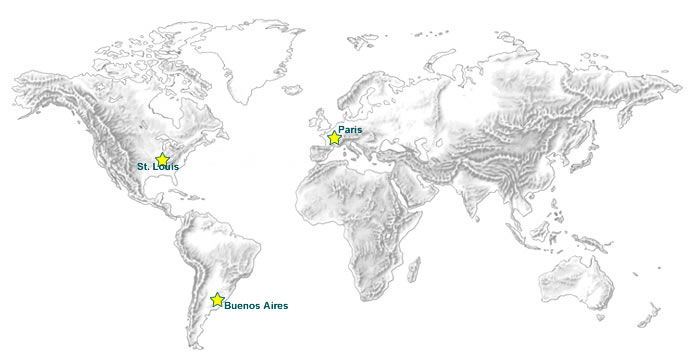Luis F. Leloir (1906-1987)
Luis F. Leloir was born in Paris in 1906 and moved with his parents to their native Buenos Aires when he was two. He received his medical degree from the University of Buenos Aires in 1932 and started his scientific career at the Institute of Physiology working on the role of the adrenalin carbohydrate metabolism with Bernardo A. Houssay. In 1936 Leloir traveled to England to begin advanced studies at the University of Cambridge. While there he worked at the Biochemical Laboratory of Cambridge, England, which was directed by Sir Frederick Gowland Hopkins. Returning to Argentina the following year, Leloir again worked with Houssay – they would continue to collaborate on various projects until Houssay’s death in 1971.
In 1944 Leloir left Argentina due to political instability. He traveled to the United States where he was appointed Research Associate in the department of Pharmacology at Washington University School of Medicine in St. Louis, working in the laboratory of Carl F. and Gerty T. Cori (co-Nobel laureates with Bernardo Houssay in 1947). The following year he worked with D.E. Green in the College of Physicians and Surgeons, Columbia University, New York. Leloir returned to Argentina, where the political situation had calmed, in 1945. In 1947 he became the first director of the Instituto de Investigaciones Bioquímicas de la Fundación Campomar. Though his laboratory had meager financial resources and lacked new equipment, Leloir’s team began research on the formation and breakdown of lactose in the body. That work ultimately led to the discovery of sugar nucleotides, which are key elements in the processes by which sugars stored in the body are converted into energy. Leloir received the Nobel Prize in Chemistry in 1970 for his discovery of sugar nucleotides and their role in the biosynthesis of carbohydrates.
Leloir remained director of the Instituto until his death in 1987.Since Leloir’s death the Fundación Instituto Campomar has since been renamed Fundación Instituto Leloir. The Institute continues to conduct research in a variety of fields, including Alzheimer’s disease, Parkinson’s disease, and multiple sclerosis. Leloir’s legacy included proving that scientific research on an international level was possible in an underdeveloped country in the middle of political strife.
Leloir was a member of the National Academy of Sciences, American Academy of Arts and Sciences, Academia Nacional de Medicina, American Philosophical Society, Pontifical Academy of Sciences, and an Honorary Member of the Biochemical Society (England). He received honorary degrees from several universities, including Granada (Spain), Paris (France), Tucuman (Argentina) and La Plata (Argentina). He was the recipient of awards from the Argentine Scientific Society, the Helen Hay Whitney Foundation (United States), the Severo Vaccaro Foundation (Argentina), the Bunge and Born Foundation (Argentina), and the Gairdner Foundation (Canada). He received Columbia University’s Louisa Gross Horowitz Award (United States) and the Benito Juarez Award (Mexico). In 1983, Leloir became one of the Founding Fellows of the Third World Academy of Sciences (now known as TWAS–the Academy of Sciences for the Developing World).

